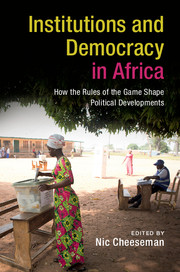Book contents
- Frontmatter
- Dedication
- Contents
- List of Figures
- List of Tables
- List of Contributors
- 1 Introduction: Understanding African Politics: Bringing the State Back In
- Part I Institutional Foundations
- Part II Law and Order
- Part III Elections, Parties and Political Competition
- Part IV Countervailing Institutions
- 12 The Legislature: Institutional Strengthening in Dominant-Party States
- 13 The Judiciary: Courts, Judges and the Rule of Law
- 14 Decentralisation: Accountability in Local Government
- 15 Conclusion: Political Institutions and Democracy in Africa: A Research Agenda
- Index
- References
13 - The Judiciary: Courts, Judges and the Rule of Law
from Part IV - Countervailing Institutions
Published online by Cambridge University Press: 05 February 2018
- Frontmatter
- Dedication
- Contents
- List of Figures
- List of Tables
- List of Contributors
- 1 Introduction: Understanding African Politics: Bringing the State Back In
- Part I Institutional Foundations
- Part II Law and Order
- Part III Elections, Parties and Political Competition
- Part IV Countervailing Institutions
- 12 The Legislature: Institutional Strengthening in Dominant-Party States
- 13 The Judiciary: Courts, Judges and the Rule of Law
- 14 Decentralisation: Accountability in Local Government
- 15 Conclusion: Political Institutions and Democracy in Africa: A Research Agenda
- Index
- References
Summary
Although somewhat less visible than Africa's turn to more democratic forms of rule in the early 1990s, the rise of ‘constitutionalism’ stands as an equally important development. This rise has been reflected, at the level of discourse, in the increasing attention that constitutions have received among scholars concerned with Africa, and with governance activists on the ground (VonDoepp 2013; Ndulo, Chapter 5). At the level of practice, it has been witnessed in the turn to rule-governed politics, as described by Posner and Young in their path-breaking 2007 article, which they revisit in this volume (Chapter 11).
As constitutions and rules now matter, it comes as little surprise that judiciaries are playing a far more visible and consequential role in Africa's democratic and hybrid regimes. As Kenyan Justice Jackton Ojwang describes, ‘[J]udicialism has become the handmaiden of constitutionalism; and it follows that, of the three conventional arms of government the one which has distinctly benefitted from the changing political philosophy is the Judiciary’ (2013: 40). Constitutionalism has empowered judiciaries; so much so, that Prempeh, writing in 2006, could suggest that ‘Marbury's legacy’ was enjoying a quiet resurgence in Africa (2006: 3).
In this chapter, I examine the rising role of judiciaries in Africa's democratic and hybrid regimes. My objectives are both descriptive and analytical. With respect to the former, I seek to detail and highlight the visible and consequential roles played by judiciaries on Africa's political landscape. From there, I turn to the analytical task of conceptualising the role of judiciaries and exploring why some might be more inclined to positively contribute to governance than others. In undertaking the latter, I develop a framework that engages with and draws from the broader comparative literature on judicial politics, and then offer an in-depth case analysis of recent judicial developments in Zambia to help illustrate central elements of my general scaffolding.
One of the central themes that I seek to illuminate concerns the importance of both structure and agency in the development and performance of judiciaries. While the former refers to institutional and contextual forces that shape the judiciary, the latter refers to the central role played by judicial actors themselves.
- Type
- Chapter
- Information
- Institutions and Democracy in AfricaHow the Rules of the Game Shape Political Developments, pp. 304 - 326Publisher: Cambridge University PressPrint publication year: 2018
References
- 1
- Cited by



